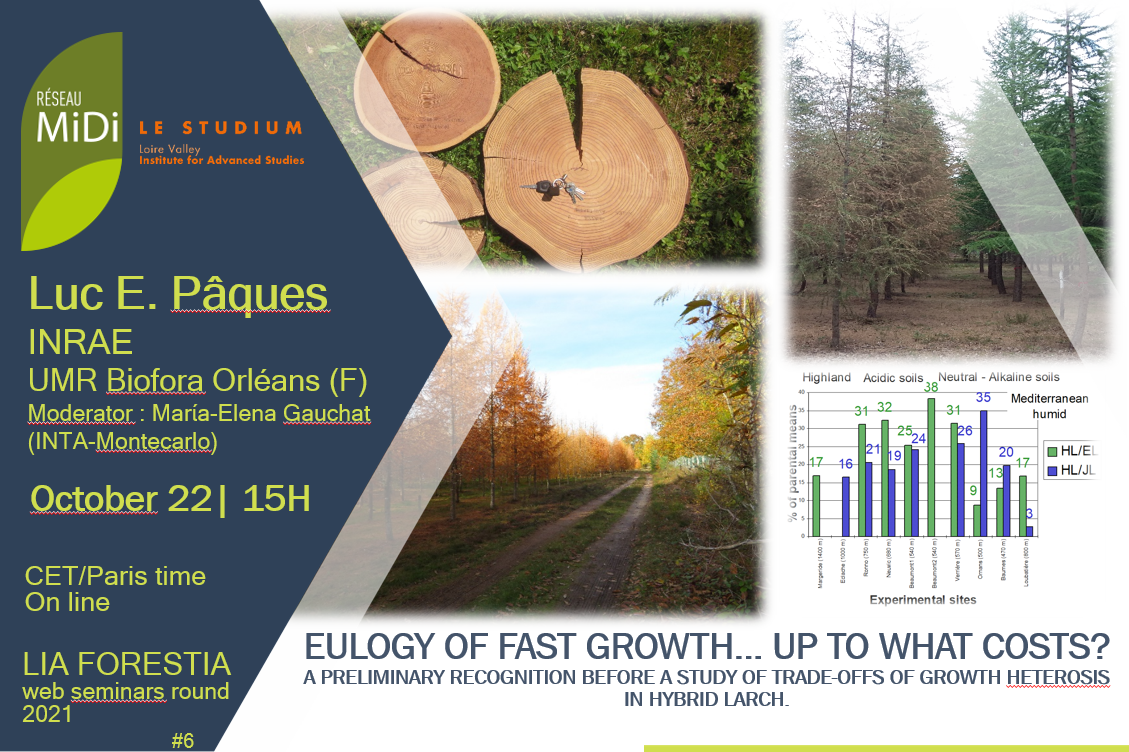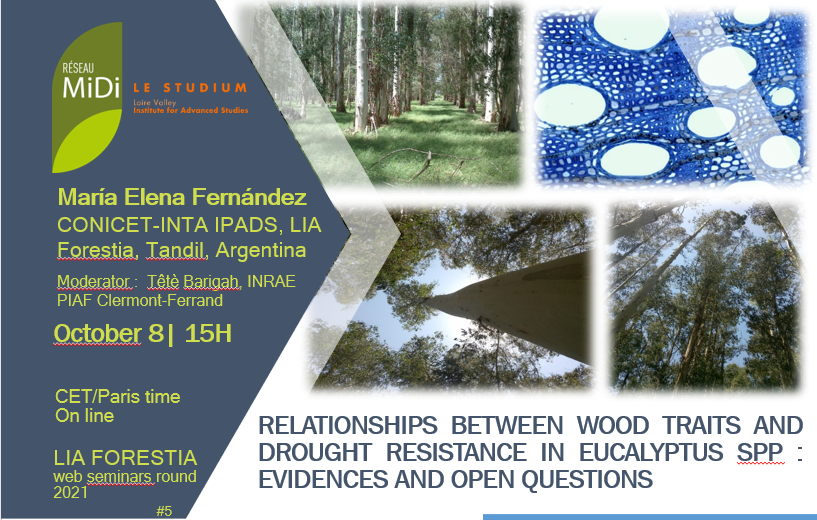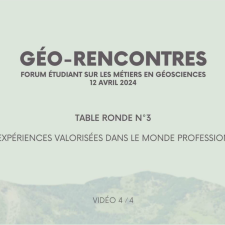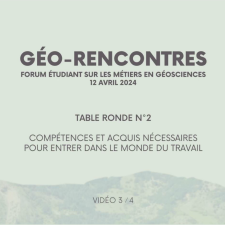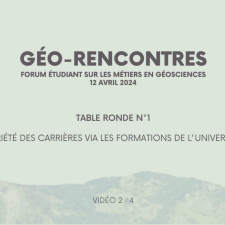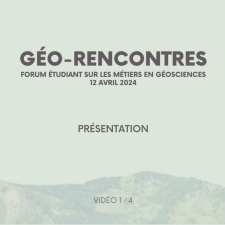Notice
#7 Genomic tools for genetic diversity management, traceability and breeding programs of eucalypts and other tree species
- document 1 document 2 document 3
- niveau 1 niveau 2 niveau 3
Descriptif
Round of FORESTIA web seminars
SEMINAR # 7
“GENOMIC TOOLS FOR GENETIC DIVERSITY
MANAGEMENT, TRACEABILITY AND BREEDING
PROGRAMS OF EUCALYPTS AND OTHER TREE SPECIES”
Dra. Susana N. Marcucci Poltri
IABIMO (UEDD INTA-CONICET), Buenos Aires, Argentina
November 19 at 15h (CET/Paris time)
The International Associated Laboratory FORESTIA starts in 2021 a new round of short seminars aimed at stimulating the scientific comunication among its members, as well as between them and other international laboratories. These seminars are a new opportunity for the FORESTIA scientists to present and discuss their objectives, research work and results on adaptation of forest ecosystems to global changes.
Seminar #7 by Dra. Susana N. Marcucci Poltri (IABIMO (UEDD INTA-CONICET)
Abstract
Our group works on the development and application of different genomic tools to support INTA´s forest and fruit breeding programs distributed throughout Argentina. For eucalypts, we have developed microsatellite markers located in candidate genes related to wood, plant growth and development traits. Recently, we have optimized a protocol for SNP (Single Nucleotide Polymorphism) discovery using ddRADseq strategy which has also been applied in other tree species (plum, peach). Based on leaves transcriptomic experiments, we have collaborated on the generation of novel genomic resources for native tree species of different genus such as Nothofagus, Prosopis and Cedrela.
These genomic tools as well as others publicly available have allowed us to evaluate the genetic diversity of different eucalypts breeding populations (E. grandis, E. dunnii, E. camaldulensis, E. globulus) and clonal seed orchards of pine species (P. taeda, P. caribaea). For clonally propagated fruit trees (such as plum and pecan) we applied these approaches to characterize and look for traceability of plant materials.
We are currently evaluating genomic selection (GS) and association mapping strategies focused on breeding programs of different eucalypts species, in a continuous collaboration with researchers from national and international institutions.
Examples of developed tools and genomic applications will be discussed.
Moderator : Pauline Garnier-Gere (UMR BIOGECO, INRAE, Bordeaux).
Dans la même collection
-
#6 Eulogy of fast growth… up to what costs? A preliminary recognition before a study of trade-offs…
Round of FORESTIA web seminars SEMINAR # 6 “Eulogy of fast growth… up to what costs? A preliminary recognition before a study of trade-offs of growth heterosis in hybrid larch.” Luc E.
-
#5 Relationships between wood traits and drought resistance in Eucalyptus spp: evidences and open q…
Round of FORESTIA web seminars SEMINAR # 5 “Relationships between wood traits and drought resistance in Eucalyptus spp: evidences and open questions” Dr. María Elena
-
-
#3 The challenge of the integrating the adaptive and technological value of wood in a changing clim…
Round of FORESTIA web seminars SEMINAR # 3 The challenge of the integrating the adaptive and technological value of wood in a changing climate Guillermina Dalla-Salda (INTA Bariloche
-
#1 Deciphering tree response to a changing climate
Round of FORESTIA web seminars SEMINAR # 1 Deciphering tree response to a changing climate Where are we? where do we go? a case study: southern beeches of Patagonia María Verónica
Sur le même thème
-
Géo-Rencontres 2024 / Les expériences valorisées dans le monde professionnel
LilloEmmaAraujoJulieHuartFlorianDubreuRomainBuquetDamienChazalLauraBorieMarianeForum sur les métiers en géosciences organisé par les étudiants du CMI Ingénierie Géologique et Civile, Université de Bordeaux, 12 avril 2024
-
Géo-Rencontres 2024 / Compétences et acquis nécessaires pour entrer dans le monde du travail
BrinonJulietteAmoleFili-FenuaPretouFrédéricCampetHugoLiébauxAlbinDe AlemeidaMarie-LouPoirierAymericDufrenoyAudreyForum sur les métiers en géosciences organisé par les étudiants du CMI Ingénierie Géologique et Civile, Université de Bordeaux, 12 avril 2024
-
Géo-Rencontres 2024 / Variété des carrières via les formations de l'université
InguimbertDianeLacazeRomaneLemaitreLaurieChazalLauraMontjeanPascalPoudevigneJacquesPortefaixFrédéricForum sur les métiers en géosciences organisé par les étudiants du CMI Ingénierie Géologique et Civile, Université de Bordeaux, 12 avril 2024
-
Géo-Rencontres 2024 / Présentation
LatasteJean-FrançoisLavieThéoForum sur les métiers en géosciences organisé par les étudiants du CMI Ingénierie Géologique et Civile, Université de Bordeaux, 12 avril 2024
-
#5 Relationships between wood traits and drought resistance in Eucalyptus spp: evidences and open q…
Round of FORESTIA web seminars SEMINAR # 5 “Relationships between wood traits and drought resistance in Eucalyptus spp: evidences and open questions” Dr. María Elena
-
#6 Eulogy of fast growth… up to what costs? A preliminary recognition before a study of trade-offs…
Round of FORESTIA web seminars SEMINAR # 6 “Eulogy of fast growth… up to what costs? A preliminary recognition before a study of trade-offs of growth heterosis in hybrid larch.” Luc E.
-
-
#3 The challenge of the integrating the adaptive and technological value of wood in a changing clim…
Round of FORESTIA web seminars SEMINAR # 3 The challenge of the integrating the adaptive and technological value of wood in a changing climate Guillermina Dalla-Salda (INTA Bariloche
-
S1- Welcoming by the MiDi network and Introducing speech
Welcoming by the MiDi network - Stéphanie Bankhead (University of Orleans, LBLGC; co-director of the network)
-
S2- Panel Discussion on “Hydrometeorological Extremes – Prevision and management of impacts”
Panel Discussion on “Hydrometeorological Extremes – Prevision and management of impacts” with Peter Braesicke (chair of ECRA network, KIT, Karlsruhe), Isabelle La Jeunesse, Elisa Palazzi,
-
S1- Horizon Europe: EU funded research and Community building in the area of climate and weather ex…
Horizon Europe: EU funded research and Community building in the area of climate and weather extreme events Philippe Quevauviller (Innovation and Industry for Security, DG HOME, European Commission,
-
S3- Wood, tree-ring and hydraulic studies of adaptation to drought in forest trees
Wood, tree-ring and hydraulic studies of adaptation to drought in forest trees Philippe Rozenberg (BIOFORA INRAE, Orléans)


